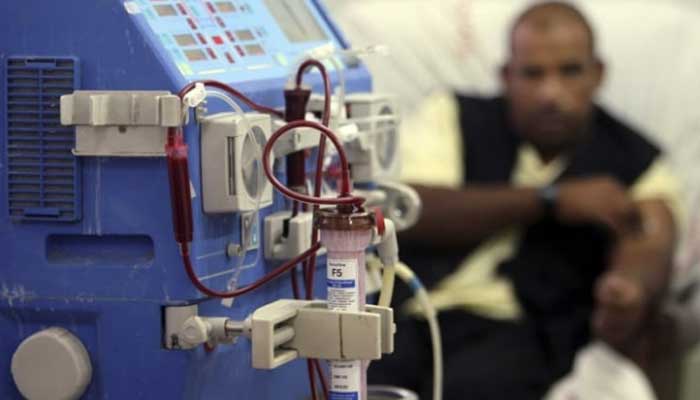Cost of dialysis up by 40% in few months, experts say
Pakistan Kidney Center CEO says number of kidney patients is constantly rising due to increase in diabetic and hypertensive patients
March 19, 2023

- "Dialysis machines cost Rs2m against Rs1.4m," Pakistan Kidney Center CEO says.
- Over Rs2m pledged for purchase of dialysis machines.
- Affluent individuals urged to donate towards medical causes.
ISLAMABAD: The cost of dialysis and treatment of kidney diseases has witnessed constant rise in Pakistan due to the rising cost of "imported consumables" used, while the number of kidney patients has also escalated following an increasing number of diabetic and hypertensive patients as well as consumption of contaminated water.
Pakistan Kidney Center Chief Executive Officer (CEO) Dr Khalil-ur-Rehman said that the cost of dialysis has increased per person in comparison to what it was a few months back.
“Now dialysis costs around Rs5,500 per person against Rs4,000 a few months back due to an increase in the prices of consumables used in the process of blood purification, while the number of kidney patients is constantly on the rise due to an alarming rise in the number of diabetic and hypertensive patients in Pakistan,” he said, speaking at a fundraising event on Saturday.
Over Rs2 million were pledged for the purchase of dialysis machines, consumables for dialysis and purchase of equipment for the 50-bed hospital for kidney patients at the Pakistan Kidney Center, which is located in Abottabad and is providing healthcare services to people from far-flung areas of Khyber Pakhtunkhawa as well as Gilgit-Baltistan.
Renowned poet Anwar Masood was the chief guest at the fundraising event, where he paid tribute to Dr Khalil-ur-Rehman, a nephrologist who came to Pakistan from Saudi Arabia and decided to establish a kidney centre.
He established medical facility in an area, the locals of which would travel to Islamabad and different cities of Punjab and Sindh for dialysis on a weekly basis.
Masood urged affluent individuals in the society as well as common people to donate generously for the Pakistan Kidney Center, saying it was catering to the health needs of the common people, who could neither afford treatment at private health facilities nor they could go to big cities like Islamabad, Lahore, Peshawar and Karachi on a weekly basis for the dialysis and treatment.
He also recited his poetry in his typical witty style and verses which mostly revolved around diseases, healthcare and economic issues of the country.
Pakistan Kidney Center CEO Dr Khalil Rehman later told the participants that now dialysis machines cost around Rs2 million against Rs1.4 million a few months back, while the cost of dialysis process has increased 40% from Rs4,000 per procedure to Rs5,500 due to rising cost of consumables. He also urged the people to donate generously for poor patients.
He said the long-term use of strong painkillers except paracetamol, viral infections like Hepatitis B and C as well as diabetes and hypertension were major causes of kidney diseases and added that kidney stones also damage the kidney and people need to get dialysis and kidney transplants later to lead a normal life.
“We are starting a 50-bed hospital at our kidney centre, where kidney surgeries and kidney transplants would be started very soon but we need huge funds from the people,” he said, adding that they had carried out over 70,000 dialysis sessions at their centre, while over 100,000 patients were seen and treated at the dialysis centre.
Urging people to adopt a healthy lifestyle, he asked that they exercise daily, consume healthy diet, drink filtered water and stay away from medicines that damage kidneys. He also urged them to donate generously to healthcare organisations, which were facing a huge flow of patients due to lack of proper healthcare facilities in the public sector.
Several other healthcare professionals, including Dr Shahid Qadir spoke on the occasion, while a large number of people and philanthropists from Islamabad, Rawalpindi, Taxila, Peshawar and Abottabad attended the fundraiser.











